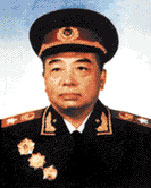Peng Dehuai
Peng Dehuai was born on October 24, 1898, in Xiangtan County of Hunan Province. He was a rough-hewn man of very humble beginnings. He had previously worked in coal mines and on lake dams. Due to his living conditions and the progressive influence of the 1911 revolution, he joined the Hunan warlords in 1916 and gradually rose through the ranks to become a senior officer. He later became a member of the Chinese Communist Party, affirming his path of life devoted to revolution.
Peng Dehuai was a much experienced veteran general. He commanded more than 200 campaigns and engagements that performed outstanding military exploits. He also enjoyed the esteem of the Chinese people and became the "ever-victorius general" in the eyes of overseas friends as well.
During the years of the "Great Leap Forward," Peng returned to Xiangtan County, his hometown, to experience the public sentiment. He gathered up a great amount of firsthand information of the rural situation and felt that it was not the direction in which China should develop. Once, when Peng visited a nursing home and found that they did not have enough food and clothing for the elderly, he couldn't help but criticize: "Nursing home? More in name than in reality!" Another comment was made when he discovered that a local compulsory boarding school was unable to supply sufficient rations for their students, saying, "For the children's health, it's better to let them live with their parents."
Before the 10th anniversary of the founding of the People's Republic of China, Peng was compelled to move out of Zhongnanhai, the central government headquarters, to Guajia Tun, which stands on the western suburbs of Beijing. While there, he connected the hydrant in his yard to the streets so that every family in the village could bid farewell to water carrier. He also shared his yard to those who lived in dangerously unsafe houses when it rained. He cared for others through birth, sickness and death, always considering the people's suffering, something that was never far from his thoughts.
Peng died on November 29, 1974.
